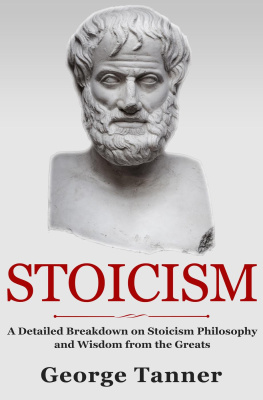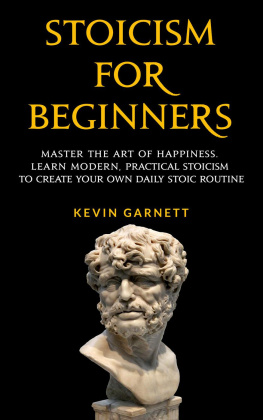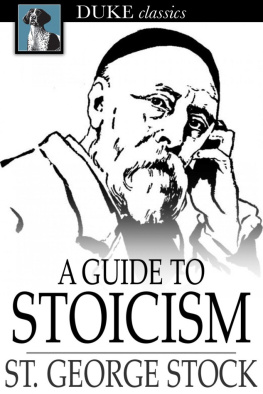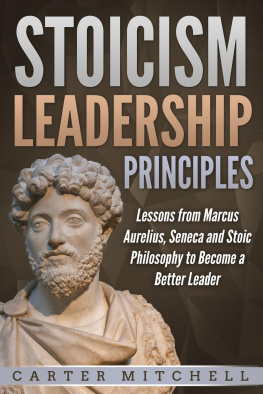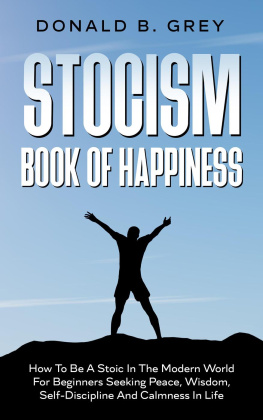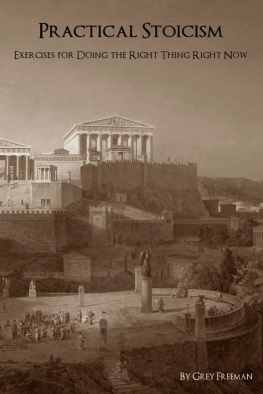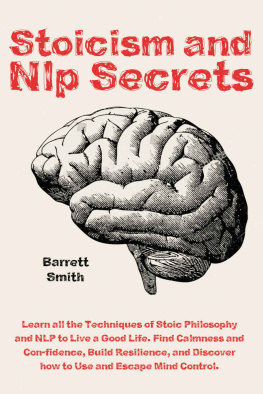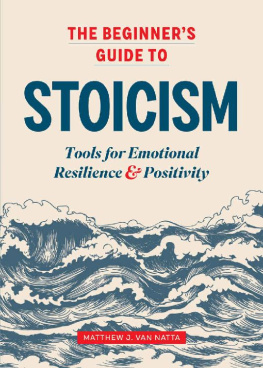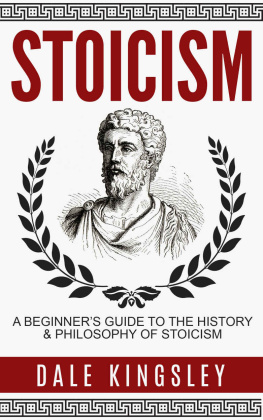Laron - Stoicism: The Practical Guide To A Virtuous Life & Unshakable Happiness
Here you can read online Laron - Stoicism: The Practical Guide To A Virtuous Life & Unshakable Happiness full text of the book (entire story) in english for free. Download pdf and epub, get meaning, cover and reviews about this ebook. year: 2015, genre: Religion. Description of the work, (preface) as well as reviews are available. Best literature library LitArk.com created for fans of good reading and offers a wide selection of genres:
Romance novel
Science fiction
Adventure
Detective
Science
History
Home and family
Prose
Art
Politics
Computer
Non-fiction
Religion
Business
Children
Humor
Choose a favorite category and find really read worthwhile books. Enjoy immersion in the world of imagination, feel the emotions of the characters or learn something new for yourself, make an fascinating discovery.

Stoicism: The Practical Guide To A Virtuous Life & Unshakable Happiness: summary, description and annotation
We offer to read an annotation, description, summary or preface (depends on what the author of the book "Stoicism: The Practical Guide To A Virtuous Life & Unshakable Happiness" wrote himself). If you haven't found the necessary information about the book — write in the comments, we will try to find it.
Laron: author's other books
Who wrote Stoicism: The Practical Guide To A Virtuous Life & Unshakable Happiness? Find out the surname, the name of the author of the book and a list of all author's works by series.
Stoicism: The Practical Guide To A Virtuous Life & Unshakable Happiness — read online for free the complete book (whole text) full work
Below is the text of the book, divided by pages. System saving the place of the last page read, allows you to conveniently read the book "Stoicism: The Practical Guide To A Virtuous Life & Unshakable Happiness" online for free, without having to search again every time where you left off. Put a bookmark, and you can go to the page where you finished reading at any time.
Font size:
Interval:
Bookmark:
STOICISM
THE PRACTICAL GUIDE TO A VIRTUOUS LIFE AND UNSHAKABLE HAPPINESS
Copyright 2015 by Seth Laron - All rights reserved.
This document is geared towards providing exact and reliable information in regards to the topic and issue covered. The publication is sold with the idea that the publisher is not required to render accounting, officially permitted, or otherwise, qualified services. If advice is necessary, legal or professional, a practiced individual in the profession should be ordered.
- From a Declaration of Principles which was accepted and approved equally by a Committee of the American Bar Association and a Committee of Publishers and Associations.
In no way is it legal to reproduce, duplicate, or transmit any part of this document in either electronic means or in printed format. Recording of this publication is strictly prohibited and any storage of this document is not allowed unless with written permission from the publisher. All rights reserved.
The information provided herein is stated to be truthful and consistent, in that any liability, in terms of inattention or otherwise, by any usage or abuse of any policies, processes, or directions contained within is the solitary and utter responsibility of the recipient reader. Under no circumstances will any legal responsibility or blame be held against the publisher for any reparation, damages, or monetary loss due to the information herein, either directly or indirectly.
Respective authors own all copyrights not held by the publisher.
The information herein is offered for informational purposes solely, and is universal as so. The presentation of the information is without contract or any type of guarantee assurance.
The trademarks that are used are without any consent, and the publication of the trademark is without permission or backing by the trademark owner. All trademarks and brands within this book are for clarifying purposes only and are the owned by the owners themselves, not affiliated with this document.
Table of Content
Introduction
Chapter 1What Is Stoicism and Why Is It such a Precious Value?
Chapter 2 How to Stoically Deal with Anger
Chapter 3 Using Stocisim to Push through Your Grief
Chapter 4 Your Shield against Fear
Chapter 5 Stoicism and Indifference
Chapter 6 A Code of Masculinity
Conclusion
FREE BONUS
Welcome! First of all, thank you and congratulations for downloading this book Stoicism: The Practical Guide to a Virtuous and Unshakeable Life. I really appreciate you putting your time and trust in me. I am truly convinced that this book is able to provide you with the value and information you are looking for.
In this book you will find a revivement of the ancient wisdom hidden in the virtue of stoicism. The aim of this book is to provide you with practical knowledge about this notion which is not only an abstraction praised by philosophers in old times. This book is your short guide to stoicism and to various means of practicing it in your life. In the following pages, you will discover why even in modern, technology-dominated, and consume-oriented times like ours stoicism remains an important value.
Stoicism can be both a tool and a weapon. If you understand it in depth and know how to practice it, stoicism can be your key to strength and to happiness. Learning how to consciously value stoicism can make you tremendously independent and unshakeable in many situations you encounter in life. If you want to rediscover an old lesson in personal empowerment in a new light, read on and allow yourself to benefit from the potential of this unique virtue.
Thanks again for downloading this book, I hope you enjoy it!
First of all, lets face it: there may be a few preconceptions about stoicism nowadays. Some people may know it was a Greek school of thought, but the rest is probably more blurry. You sometimes hear this notion used in contexts that associate it with indifference, apathy, or total lack of emotions. Is this true? What makes it different from something like autism or psychopathy then? They all seem to verge on diminished emotionality somehow.
Stoicism is first and foremost about self-mastery. Its by no means a disorder and it implies no harm or poverty of experience. Stoicism comes down to a life philosophy meant to improve ones attitude in front of any kind of difficult situations as well as ones relationship with oneself. Its fair to say stoicism values control over emotions and it doesnt necessarily imply an emotional deficit. You could say with a significant degree of generalization that stoicism is the art of intelligently dealing with your emotions for the sake of higher achievement and satisfaction.
Stoicism starts from the premise that self-control is at the root of victory over weakness or excessive subjectivity. This mentality places an internal locus on control above everything else and this is achieved mainly through endurance in hardship and sovereignty over emotions. If you want to understand the essence of stoicism at lightning speed and in an error-free manner, just think of the words of Marcus Aurelius: If you are distressed by anything external, the pain is not due to the thing itself, but to your estimate of it; and this you have the power to revoke at any moment.
Stoicism was a school of thought in ancient Greece that won a considerable number of followers, but also stirred a degree of controversy. It was founded in Athens by Zeno in the 3 rd century BC. Its most important adepts were Marcus Aurelius, Cicero, Seneca, and Epictetus. This movement marked the Hellenistic period and attempted to propose a way of behavior in life that could free people from the risk of making judgment errors. Stoicism stands out because it is more than a philosophical direction. On a deeper level, it includes a code of ethics, an effective psychology, and even implicitly a few notions of masculinity. Thats why it is so interesting and practical: can you really apply Cartesian philosophy as a way of life? Can you say you lead a life according to the principles of Phenomenology without appearing wrapped in your own consciousness and maybe detached from the objective world? Stoicism is more than philosophy: it is a value to cultivate in yourself and it has considerable practical benefit if you incorporate it in your mentality and behavior.
Stoics believed that emotions can lead to excessive subjectivity and misjudgment. They supported an attitude of calm and dispassionate control, since they thought emotions (especially negative ones like envy, anger, or fear) could blur ones mind, interfere with mental capacities, and estrange one from the truth. At the core of stoicism lies an appreciation for inner strength and solidity as well as a love for truth. The ideal self that such a life philosophy holds as a standard of thought and behavior is the wise person, the sage. It is an ideal of perseverance and maturity; it implies having internal resources in front of hardship and relying on the self as a measure of everything. The inner self prevails over external factors that could influence the person in the stoic doctrine. This philosophy draws on a fascinating paradox: on the one hand, the internal emotional reality is treated with suspicion and questioned; on the other hand, external forces must also be resisted, since in stoic thought it is only your own self that you can rely on.
Stoicism aimed at reaching a form of intellectual, moral, and psychological perfection. The person who practiced this virtue could face practically anything in life, any kind of misfortune or difficulty. Stoicism implies endurance and learned invulnerability. One might say stoicism contradicts positive psychology, since it signals that people undergo hardship and must face that sternly. It even encourages a form of awareness of potential negative scenarios that at first sight could verge on pessimism. In his book A Guide to the Good Life , William B. Irvine mentions that stoicism implied a form of negative visualization that was meant to keep the mind alert in front of things that could go wrong. Stoics believed that excessive optimism is also a delusion, just like other emotions, and as such it can cause harm to people. Blinding yourself to what could go wrong or to negative aspects of a situation and forcing yourself to see only the bright side is not strength. Stoicism can help people reach a form of immunity to hardship by facing it head-on and overcoming it.
Font size:
Interval:
Bookmark:
Similar books «Stoicism: The Practical Guide To A Virtuous Life & Unshakable Happiness»
Look at similar books to Stoicism: The Practical Guide To A Virtuous Life & Unshakable Happiness. We have selected literature similar in name and meaning in the hope of providing readers with more options to find new, interesting, not yet read works.
Discussion, reviews of the book Stoicism: The Practical Guide To A Virtuous Life & Unshakable Happiness and just readers' own opinions. Leave your comments, write what you think about the work, its meaning or the main characters. Specify what exactly you liked and what you didn't like, and why you think so.

